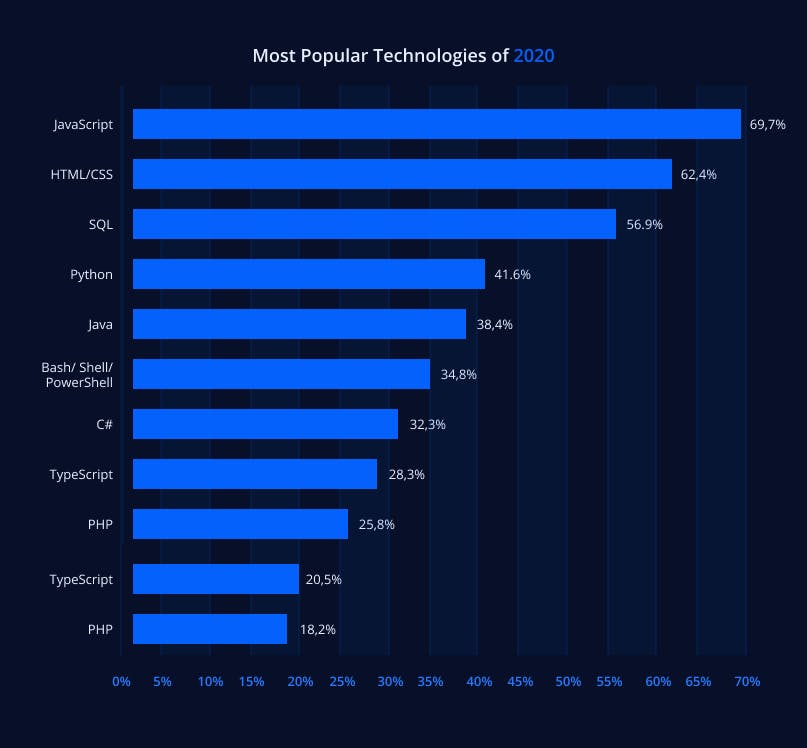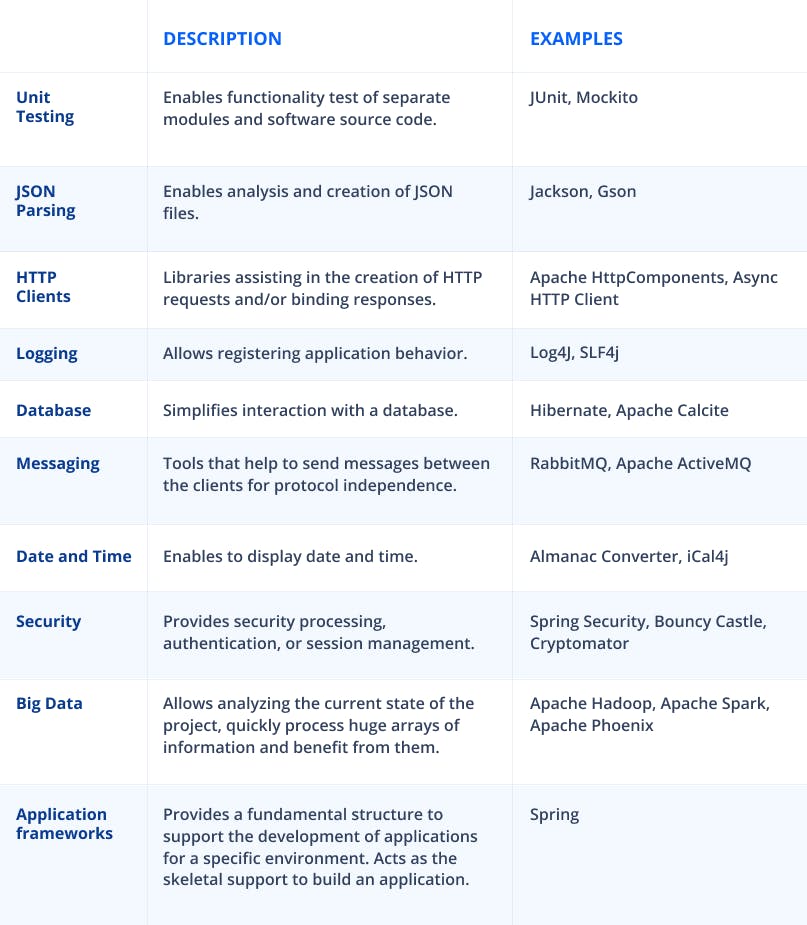How to Hire Java Developers: The Time is Now
Looking to hire Java developers? In this article, you will find out how to interview and where to find them, how much do they cost, etc.
Java – is a programming language that is used to create various projects and is not related to any specific domain.
Games and applications on Android, desktop allocations, cloud data storage, etc. Java application field is so broad that we can certainly say that almost every person used the results of Java developers’ work. Application of Java also spreads to:
- Big data;
- Analytics;
- Machine learning;
- Robotic medicine, and other.
Despite the language was created back in 1995 it is still actively used nowadays. Statistical data speak in favor of it. According to the 2020 Stackoverflow survey, Java is in the 5th position among all the software development technologies.

The broad application scope of Java and its high popularity can complicate the search for developers. This article will help you understand how to find a Java developer.
What does a Java developer do?
In 2021 there are about 9.4 million Java developers on the globe. This figure keeps growing daily. Before you determine what developer of this great number you precisely need, you should clearly understand the project tasks you want this person to accomplish.

Core responsibilities of a Java developer might include:
- Creation of application design and logic;
- Testing and revealing probable bugs;
- Debugging and tweaking to the operational state;
- Project implementation;
- Technical project support on all the stages.
Depending on your project specifics, the scope of the developer’s responsibilities of a developer can increase, decrease and vary in terms of complexity.
What are the skills required for a Java developer
A developer should possess certain skills to be able to fulfill all the assignments.
Skills are divided into soft and hard skills:
- Soft skills relate to the ability to interact inside the team. They also account for the developer’s motivation and discipline. Soft skills are covered in depth in our article Why Soft Skills Matter When Hiring a Software Developer.
- Technical skills determine how a developer fulfills your tasks: create an application in particular.
Hard skills every Java developer should have
Skills a Java developer should have:
- Basic knowledge of Java;
- Experience of applying Java build tools: Maven and Gradle;
- Experience with Java libraries;
- Experience with Java frameworks;
- Knowledge of object-oriented programming basics and coding patterns;
- Knowledge of Java testing tools: Selenium и TestNG;
- Basic knowledge of HTML layout;
- Ability to work with Git control systems;
- Ability to work with databases.
The list of skills can be increased depending on the particular requirements of your project.
Java libraries every mobile developer need to know
One of the distinctive features of Java is its multifunctional and extensive library base. Libraries are a set of ready functions, objects, models, classes, etc. used to address project tasks.
The skill of working with libraries is a must, as it reduces time input to create a project at all stages, reduces the number of errors in the code, and facilitates development.
The most common libraries used for Java applications are listed in the table below. No matter what project you want to implement, a developer will most likely need them:

A developer might need knowledge of other libraries working on your project. Follow this Github link to learn more about other libraries in depth.
We recommend consulting your CTO (if you are not the one) to help you define the list of libraries required for your specific project.
What are the interview questions for Java developer
Java developers can be divided into three levels of competence: Junior, Middle, Senior. These levels help to get a better understanding of the developer’s skills, experience, salary, etc. For details on each level, tasks, and when each of them suits you, read our article 5 software developer levels: whom to choose to get more details about every level, tasks that can be completed by developers of different seniority levels, and when these levels are appropriate for your particular needs.
You can determine the exact level of a developer with the help of an interview. Interviews are divided into two stages. The first – theoretical assessment. The second – practical tasks. During the theoretical assessment, technical questions about the Java language are asked. In the second phase, a developer is given a coding task to fulfill. Learn more about what a coding task is and where to find practical tasks in our article Top 8 Best Coding Interview Platforms.
Junior Java interview questions
Q1. What is the difference between JDK, JRE, and JVM?
A1.
- JDK Java Development Kit – JRE and a set of development tools in Java language: Java compiler, standard libraries of Java classes, different utilities, etc.
- JRE Java Runtime Environment – environment to run Java programs. It contains JVM and a standard set of Java class libraries.
- JVM Java Virtual Machine – Java programs code interpreter.
Q2. What are the existing java access code modifiers?
A2.
- Private: members of the same class are available only within the class.
- Default (access on the package level): visibility of class/members only within the same package.
- Protected: class members are accessible within the same class as well as outside the class, but only through inheritance.
- Public: class/class members are accessible to all.
Q3. What Java constructions is static modifier applicable to?
A3.
- Fields;
- Methods;
- Insert classes;
- Members of the import section.
Q4. When can ClassCastException be thrown in the application?
A4. ClassCastException – is an exception that will be thrown if an error in typecast occurs.
Middle Java interview questions
Q1. Why do we need equals()? What is the difference from ==?
A1. If a class doesn’t predefine the equals method, the equals(Object o) method of the closest parent class, predefining this method, is used by default.
If parent classes have no predefinitions, the Object#equals(Object o) is used. В Object API is the same as ==.
The == operator checks if two variables have the same references (same as a memory address).
Q2. What is the difference between fail-fast and fail-safe iterators?
A2. The Fail-fast iterator generates ConcurrentModificationException if the collection changes within the iteration and the fail-safe doesn’t.
Q3. Why do we need HashMap, if we have Hashtable?
A3.
- Methods of the Hashtable class are synchronized that leads to performance slowdown and HashMap – are not synchronized;
- HashTable can’t contain null elements, HashMap can contain one null key and any number of null values;
- Hashtable is an obsolete class therefore it is recommended for use.
Q4. Is finally block always executed in Java?
A4. The final block is always executed unless there are abnormal program shutdowns caused by JVM breakdown or calling of System. exit(0).
Senior Java interview questions
Q1. What serves as mutex if the method is declared as synchronized?
A1. An instance of the given class.
Q2. Why is the clone method declared protected? What is required to realize cloning?
A2. It highlights that though there is a method in the Object class, if a developer wants to use it he needs to reassign it. To do this, the Clonable interface should be realized to follow the contract design.
Q3. Explain what a deadlock is? Give an example that demonstrates deadlock.
A3. The situation when several streams are in the infinite waiting mode resulting from waiting for resource deallocation occupied by them.
class Entity {
public synchronized void method1(Entity entity) {
entity.method2(this);
}
public synchronized void method2(Entity entity) {}
public static void main(String[] args) {
Entity en1 = new Entity();
Entity en2 = new Entity();
new Thread(new Runnable() {
public void run() {
en1.method1(en2);
}
}).start();
new Thread(new Runnable() {
public void run() {
en2.method1(en1);
}
}).start();
}
}
Q4. What is the difference between Java NIO and Java IO?
A4. The main difference is between the approach to the organization of input/output and that Java IO is stream-oriented and Java NIO – buffer-oriented. Read data is streamed to a buffer for further processing. In a buffer, you can move back and forth. It gives a little more flexibility when processing data.
How much does it cost to hire Java developers
The next important hiring step is to understand the rates of developers. Define approximate costs.
The table below providing the average annual income in different countries will assist you. The values are taken from the Glassdoor:

The table demonstrates that the location and seniority level of a developer are the key determining factors for changes in labor costs.
The cooperation model is another factor determining your developer’s cost. More details on cooperation models are provided in our article InHouse vs Dedicated vs Freelance Developers: How to Choose?
Final thoughts
In this article, we’ve covered the basics of how to hire Java developers. Reviewed the typical Java developer responsibilities, required skills, and libraries. Listed the questions that you should ask the developer in the interview based on his seniority level. We also provided data on the average annual salary of a developer based on his level and location.

